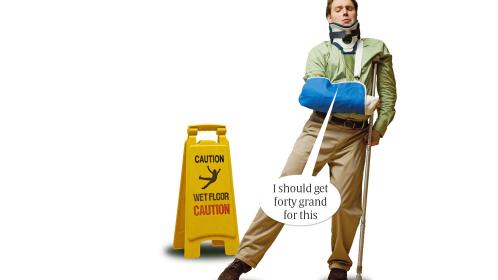
How insurers are beating dodgy claims
With fraud costing €200m a year, insurers are scouring social media and using private investigators to expose cheats
David Ward was removed on a spinal board from the scene of the “crash” in July 2013 after the car, in which he had been a passenger, apparently rear-ended a vehicle driven by Lynsey Ivory. Ward and Ivory, who both complained of neck and back pain, were taken to hospital in the same ambulance. The two professed not to know each other, but gardai called to the scene were suspicious, as neither car’s airbags had been deployed.
Both would later file personal-injury claims against FBD Insurance, expecting payouts of €15,000 each. An FBD claims handler performed a perfunctory search on social media and discovered that the “strangers” featured in each other’s Facebook profile pictures.
It emerged that Ward and Ivory were engaged and had two children. Ward told gardai he wanted the cash to spend on his children and their forthcoming wedding. The couple married before their trial in 2015, when Ward was sentenced to a year in jail for attempted insurance fraud. Judge Martin Nolan spared Ivory from jail, saying “somebody has to mind the children”.
It was one of the first Irish cases in which those making fraudulent insurance claims ended up with criminal convictions, after being given away by their social-media accounts. There has since been a spate of personal-injury cases being thrown out of court and the claimants being made to pay legal costs. Their exaggerated claims have been revealed in evidence from private investigators or social media accounts, or because their stories were incredible.
Obviously, many people do get into real car accidents and suffer from genuine injuries. In these cases, you can look here for a personal injury attorney who can help you. Unfortunately, fraudsters often take resources away from the people who really need help. With so many fraudulent claims, it can be hard to have a real claim be heard in court, which is frustrating and upsetting to those who are truly injured.
With increases of 47% in insurance premiums since 2011, the industry has been blaming legal costs, the size of court payouts and fraudulent claims. It estimates that fraud costs €200m a year. So can insurers turn the tables on those who lie or exaggerate their claims?
In December 2015, Rita Milinovic, a 29-year-old Lithuanian, claimed up to €60,000 damages from a car accident that she said had left her in too much pain to continue in a waitressing job.
Shane English, barrister for the insurance company, confronted her with Facebook photos that showed her walking up Bray Head shortly after the accident, and taking part in body-sculpting competitions wearing a bikini. “You have been wincing in agony in the witness box while giving your evidence and denied on oath you were ever a member of a gym,” English said. “You have told us nothing about your sports hobbies, until your own Facebook pictures were presented to the court. Your case from beginning to end is a lie.” The judge Raymond Groarke said: “The person we see in these photographs is a fine human specimen who is clearly in the best of physical condition.” He dismissed the case with costs against her.
Last May, Jason Shelly, 25, sought €60,000 in damages for back pain suffered in a car accident, but had his case thrown out after it emerged that he had commented on Facebook about participating in races afterwards. The judge Jacqueline Linnane also ordered him to pay costs.
These are some of the reasons why having a good car accident lawyer by your side becomes essential. You need to have the right kind of support to go against big insurance companies and win the case. Insurance companies have vast resources and legal teams at their disposal. You may require the services of a personal injury attorney who is capable of confronting them and fighting for you. Car accidents can cause serious damage, and sometimes even irreparable damage. It can cause significant physical harm to the victim. Burns, disfigurement, permanent disability, brain injury, organ damage, and other injuries can all result from car accidents. In some extreme cases, car accidents have also resulted in wrongful deaths. Keep in mind that car accidents can also lead to a significant amount of emotional distress or financial strain. Additionally, you might need to either replace your vehicle entirely or repair it, adding to the financial burden.
As a victim, you are entitled to compensation for these losses, and an auto accident lawyer from law firms like Grillo Law (grillo.ca) might understand how to make the process simple for you. Hiring a personal injury attorney can help ensure that you receive all of the available remedies to resolve your claim.
Earlier this month, Groarke dismissed another personal-injury claim with costs. Esther Lamidi, who had been driving on a provisional licence for 17 years and had failed her driving test between four and six times, was recorded jogging across a street and getting into her car without restricted movement on the same day she told a medical examiner she was “unable to function in any way” because of back and leg pain. Groarke concluded that Lamidi had told “blatant lies”.
A spokesman for Liberty Insurance said it believed the system encouraged “fraudulent and opportunistic claims, which have an impact on honest customers and policy holders”.
Last year Nicholas Kearns, the retired president of the High Court, challenged the insurance companies to take on those who made fraudulent claims “to the end” and report them to gardai.
The government’s Cost of Insurance Working Group report, published in January, reviewed the legislation governing fraudulent claims. Section 25 of the Civil Liability and Courts Act 2004 makes it a criminal offence to give false evidence in a personal injuries action, while section 26 allows courts to dismiss a claim when a plaintiff has knowingly given false evidence. The review found that neither section needed reform, but the number of referrals to gardai under section 25 was “very low” so more co-operation between insurers and the authorities was needed.
Liberty Insurance said referrals to the gardai would be a “key focus” in 2017. “We have developed our own fraud analytics database to identify suspicious cases across all products and areas of our business,” it said. “Our claims fraud detection has increased by 25% over the past two years. While this is due to better detection methods, it also suggests an adverse trend in overall levels of fraudulent claims. The number of suspected fraudulent claims we have referred to gardai increased by 50% in 2016.”
Insurance Ireland, an industry representative body, said it did not collate statistics on the number of fraudulent or exaggerated claims handled by its members each year, as it was “sensitive”.
David Fitzgerald, chief executive of the Motor Insurers’ Bureau of Ireland, which is responsible for claims against uninsured drivers, said it was determined to put a stop to fraudulent and exaggerated claims. “We are taking a stringent approach to tackling these cases,” he said. “Where the evidence does not support the claim, the entire incident will be thoroughly investigated. All of our investigative resources will be used to help stamp out fraud. We are also working with the gardai to ensure justice is done.”

Rita Milinovic claimed up to €60,000 damages from a car accident
Ken Murphy, director-general of the Law Society, which represents solicitors, said he had a cynical attitude to the “nice round numbers” the insurers put into the public domain. He insists that false claims are “extremely rare” and “should be fought”. He claimed some of those who made fraudulent claims might have been inspired by the insurance industry’s practice, in the past decade, to offer quick settlements, in what he called the “false economics” of trying to limit costs.
Murphy also insisted that solicitors of clients who made false or exaggerated claims could not be blamed. “For a solicitor to knowingly assist a client in bringing such a claim would, if proved, in all likelihood be career-ending,” he said. “It is likely that their name would be struck off the roll by the president of the High Court on the application of the Law Society, which would consider such conduct reprehensible. In addition, the solicitor could and, in the view of the Law Society should, be prosecuted for criminal conduct, with prison as the likely result of conviction.”
He said in no case had a judge reported a solicitor to the Law Society with evidence that they had knowingly brought a spurious claim on behalf of a client.
One legal source said many of the personal-injury cases in which claimants were found to be giving false evidence had come before the Circuit Court, where the disclosure rules are more lax. Notice that the defence would be tendering evidence from a private investigator might come only on the morning of the trial, while evidence from social-media accounts might be presented for the first time while the claimant was under cross-examination.
The source said that, as claimants often hired lawyers on a “no foal, no fee” basis, they sometimes insisted on pushing ahead with a hearing even when insurers appeared to have evidence that a claim had been exaggerated.
The real chancers will press ahead, regardless, because they see it as a free shot
One lawyer said he believed the high-profile “gotcha” cases discouraged genuine claimants, who worried about being stuck with costs if a judge found they had misled the court, however accidentally.
“Sometimes a guy might get a date wrong and the defence will make out he has given dishonest evidence,” the lawyer said. “Often the real ‘chancers’ will press ahead, regardless, because they’re just not a mark for costs. They see it as a free shot.”
Since 2015, private investigators have been required to be licensed by the Private Security Authority. The data protection commissioner has also been carrying out regular audits of private investigators and has prosecuted those who have been found to have obtained information illegally, such as from sources in the Department of Social Protection.
“There is a lot more compliance that has to be adhered to,” said one investigator. “We have licences now, but before that there was no regulation. The insurers didn’t have confidence in us if something went wrong.
“Now we are regulated, they feel more confident employing us, and the courts are more willing to accept evidence of surveillance or from social media.”
Investigators would usually use social media to establish a profile of person before starting surveillance. It was unusual for a social-media trawl to present evidence that would instantly undermine a claimant’s case, however, he said.
In normal cases, surveillance might take place over two to three days. If there were indications from a medical report that a person might be exaggerating injuries, a further surveillance could be commissioned. “There are cases where we have got good evidence but they still walk away with something,” the investigator said. “It could be because they do, or did, have an injury to some extent but have exaggerated [it]. From a business perspective, it may make sense to settle. We are never privy to this information [on why a case settles].”
While it may seem that the state and the insurers are gearing up to attack the credibility of claimants, the Court of Appeal recently issued a judgment that limits the powers of judges to dismiss claims, even when a plaintiff is found to have given false evidence.
In a 2012 High Court case, Billy Nolan, an alarm-fitter who suffered serious injuries when a car collided with his motorbike, was refused any part of a €192,444 damages award, after he was found to have given false evidence about his pay and whether his injuries had forced him to give up his hobby of “car drifting”. The defence found videos on Nolan’s Bebo page showing that he continued to take part in drifting events, despite telling an occupational therapist his injuries did not allow this.
The Court of Appeal, however, granted Nolan €153,952, after the judge Mary Irvine said he could not be found to be misleading the court, since the defence failed to cross-examine him about discrepancies in his salary levels. She also pointed out that he had not claimed special damages because of his inability to participate in car drifting. Irvine said she found it difficult to see how Nolan’s comment on car drifting was “sufficiently material”, so that “his claim should be considered fraudulent and be dismissed on that account”.
So even if claimants are found to be dishonest in their evidence, it will not necessarily sink their cases unless the untruth was central to their claim for damages. Another hurdle for insurers to overcome.






